Bobcats are always themselves. I live near a national park where I see them frequently, Lynx rufus californicus, along with badgers, coyotes, owls, otters, and more in the wild. I am always thrilled, and I savor the idea of another creature, out on its own, fending for itself, as they say, executing its evolved nature with the tools time has willed to it.
Though I sit inside at my desk right now, the bobcat I photographed last weekend is at this moment somewhere among the chaparral, resting for its next hunt, or sheltering from the rain under a boulder, or swiveling its ears to locate a coyote chorus on the next ridge, and gauge its distance. Last Sunday this cat stalked, caught, and ate a gopher in front of me, licked its paws and then walked away.
I suspect our evolution includes being enthralled by carnivores.
For one thing, we should find them (at least) interesting for our own well-being, lest we become prey. But for another, their presence signposts a healthy environment including food, water, cover, etc. So, they’re meaningful to us, whether the message is a threat or a reassurance. This is just an idea, and sometimes in evolutionary biology people are guilty of constructing what are called “just so” stories, which sound plausible but are not disprovable, and therefore don’t count as scientific theories.
Recently I’ve been concerned with trapping and hunting, especially trophy hunting and killing contests.
I struggle to understand it. I recommend an article by Todd Wilkinson called A Death of Ethics: Is Hunting Destroying Itself? Hunters are not all the same, it argues, and should not all be tarred with the same brush (or rather shot with the same shotgun). I think that’s right to a certain extent.
Embedded in the article is an unsettling photograph of a dead or dying coyote, which I won’t attempt to describe here, but which revisits me, unexpectedly and against my will. The article also includes a video of someone hunting a coyote—successfully, I regret—with a snowmobile. Note I said with a snowmobile, not from a snowmobile. I know it’s not easy but just think about that. I know someone who won’t look at that picture after I described it to her. I myself have not (yet?) watched the video (and am re-conveying its content only from the written description).
The photograph and the video both come to us via social media, where the context, by the way, is conquest, not prosecution (or even just shame). In other words, whoever did this unspeakable act doesn’t mind speaking about it and is so callous (and, as I will argue, ethically crippled) as to brag about it. He has probably done it again since, who knows how many times. I can pity the “hunter” almost as much as the coyote, but I can only empathize with the canine.
How can this be? How can someone do such a thing, and be unconcerned with the dreadfulness of it?
Of course, we know there are psychopaths in our society, who are constitutionally incapable of empathy. But I don’t think that’s what this is. For one thing, there are too many people entirely cold-hearted towards animals for us to dismiss it is as neurologically crossed wires. Many of these people appear to be morally normal in other respects. You may have heard about the Florida teacher who drowned two raccoons and a possum in front of his students, as part of a lesson. Or the Idaho game commissioner forced to resign after killing an entire family of baboons with bow and arrow in Namibia (and yes, boasting about it on the web). And you know about Cecil the lion. Just a few days ago customs officers in India found a weakened leopard cub in a man’s luggage. Less anecdotally, Bobcats are legally “harvested” for the fur trade in 38 US states, and in seven Canadian provinces.
And whereas serial killers (of humans) don’t form social clubs, don’t solicit sponsorship for killing contests, and don’t generally run classroom demonstrations, there is evidence linking zoosadism with violence towards people. Some of the literature characterizes zoosadism as a precursor to psychotic behavior, rather than as a form of it.
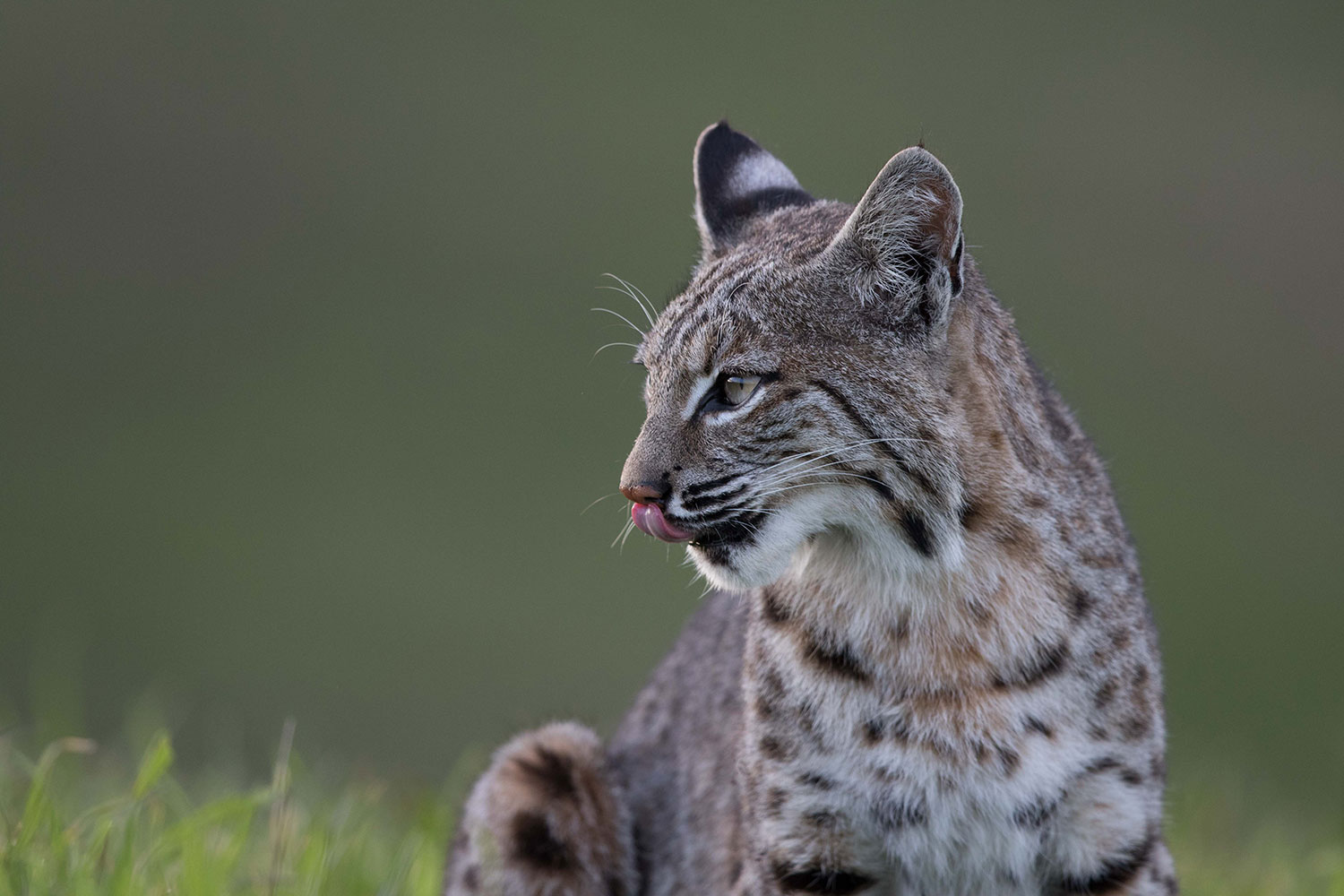
In Wilkinson’s aforementioned article, he carefully differentiates classical hunters in the Teddy Roosevelt tradition, who follow a clear code of ethics built around fair pursuit, no wanton waste, and respect for the animal, from the thrill-seeking, bloodlust, snowmobile crowd. (If you doubt the prevalence of the latter, just google “killing contests.”) This seems the main point of the article.
Although those differences are important, there is something in common between the two groups.
Consider this argument:
- Premise 1: It is wrong to cause suffering unnecessarily.
- Premise 2: Trapping and hunting, especially trophy hunting, cause suffering unnecessarily.
Conclusion: Therefore, trapping and hunting, especially trophy hunting, are wrong.
In logic, an argument is called “valid” when, if the premises are true, then the conclusion must be true. An argument is called “sound” if it is valid and its premises are true. If it’s sound, then its conclusion is true – it’s right, and there’s no getting around it. Reading the above syllogism, it’s hard to see how it could be invalid except in some technical, esoteric sense. But it could fail to be sound if one or both of its premises are wrong.
One way that could be is if some hunting or trapping is necessary (then the second premise is false). “Necessary” here could mean the activity is subsistence, a matter of survival. In 2019, in the United States anyway, you would be pressed to substantiate such a claim, but for the sake of argument let’s say we admit some hunting is a matter of survival and perhaps some trapping is literally the only available livelihood for some people in some circumstances. Such cases are excluded. Trophy hunting and killing contests are certainly not.
(By the way, sometimes you encounter this reasoning: if animals hunt, it’s natural, and people are part of nature; therefore hunting by people is not wrong. But firstly, most hunting by animals is subsistence. People don’t need to eat meat at all. More to the point, moral questions don’t arise in the first place unless there is choice involved. We can’t say if animals do it then it’s OK, otherwise, we include infanticide, rape, cannibalism, etc.)
The more significant and relevant challenge to the argument is if the first premise is false, which would be the case if animals don’t suffer, or if only human suffering matters. In his now famous work, Practical Ethics (1979), Peter Singer writes:
“The basis of my belief that animals can feel pain is similar to the basis of my belief that children can feel pain. Animals in pain behave in much the same way as humans do, and their behavior is sufficient justification for the belief that they feel pain. It is true that, with the exception of a few animals who have learned to communicate with us in a human language, they cannot actually say that they are feeling pain – but babies and toddlers cannot talk either. They find other ways to make their inner states apparent, however, demonstrating that we can be sure that a being is feeling pain even if the being cannot use language. To back up our inference from animal behavior, we can point to the fact that the nervous systems of all vertebrates, and especially of birds and mammals, are fundamentally similar. Those parts of the human nervous system that are concerned with feeling pain are relatively old, in evolutionary terms. Unlike the cerebral cortex, which developed only after our ancestors diverged from other mammals, the basic nervous system evolved in more distant ancestors and so is common to all of the other ‘higher’ animals, including humans. This anatomical parallel makes it likely that the capacity of vertebrate animals to feel is similar to our own.”
Peter Singer, Practical Ethics
As to the idea that maybe only human suffering matters, I offer one quote for and one against:
For:
“And God blessed them, and God said unto them, Be fruitful, and multiply, and replenish the earth, and subdue it: and have dominion over the fish of the sea, and over the fowl of the air, and over every living thing that moveth upon the earth.”
Genesis1:28
Against
“The day may come when the rest of the animal creation may acquire those rights which never could have been withholden from them but by the hand of tyranny. The French have already discovered that the blackness of the skin is no reason why a human being should be abandoned without redress to the caprice of a tormentor. It may one day come to be recognized that the number of the legs, the villosity of the skin, or the termination of the os sacrum, are reasons equally insufficient for abandoning a sensitive being to the same fate. What else is it that should trace the insuperable line? Is it the faculty of reason, or perhaps the faculty of discourse? But a full-grown horse or dog is beyond comparison a more rational, as well as a more conversable animal, than an infant of a day, or a week, or even a month, old. But suppose they were otherwise, what would it avail? The question is not, Can they reason? nor Can they talk? but, Can they suffer?”
Jeremy Bentham, The Principles of Morals and Legislation, 1789
I’m tempted to omit any adjudication but will say it’s equally easy to produce old testament quotes to justify genocide (of humans). Of course, it’s not just Christian societies which have traditionally battered animals as if they were inanimate and insignificant. But the first quote is just the kind of anachronism the Enlightenment shed light on, exposited via such insights as offered in the second quote.
There’s an idea contained in the second quote which I think is worth pondering, and this is how I try to answer the question of how someone can kill a coyote with a snowmobile and brag about it. Some people don’t care about animals because they don’t think of animals as anything to care about. As implied in the second quote, and of course well past 1789, some people thought it was ok to enslave Africans because they didn’t think of Africans as anything to care about. Women were once property; at one time children were rather beaten than heard. One can conceive of the entire progress of ethics and regard for justice in human society as an ever-expanding sphere of consideration, from the self to the family, to the clan/tribe, race, nation, and not-quite-finally, to the global community. “Not-quite” because if you accept that you must be morally concerned with anything capable of suffering, then the species boundary is arbitrary, and must fall.
Incidentally, if that is right, then “nationalists” could be considered in some sense morally evolved by virtue of the ability to care about strangers, to feel a kinship with their countrymen… although of course, the ugly reality of it includes jingoism and xenophobia. I wonder if people involved in wildlife killing contests are more likely to be concerned with “illegal aliens” and supportive of border walls and the like.
Another noteworthy aside is that some people who apparently don’t feel it necessary to grant any sympathy to wild animals nonetheless genuinely love their own pets (sometimes these are hunting dogs). So, the same person who will sleep with their dogs and send them out to tree a mountain lion ahead of their taking the heroic shot will genuinely mourn if one of those dogs is killed by the beset cat. The apparent inconsistency is not on its face problematic and might be explained by considering that the dog is accepted into the tribe, so the ever-expanding sphere of consideration is not actually strict with respect to species but uses other criteria.
Anyway, I am suggesting that categorically excluding (wild) animals from any moral consideration is a necessary aspect of a classic, Roosevelt hunter or Voyager trapper as much as it is of a less palatable and courser death-fetishist as would hunt a dog with a snowmobile. The former is less objectionable to the populace, and is woven into our cultural history, and would rather the latter go away so as not to scrape at the veneer of tradition.
The former, too, maintains that respect for the animal is necessary (one of the three pillars of the hunter’s moral code), and this is a serious point. I wonder, however, if one can respect a wild animal and kill it.
I realize one can pull the trigger or release the bowstring with an attitude of respect, and I have no doubt this is often the case. But is that what’s important, the frame of mind around the act?
If that’s the important part, then, of course, one could commit murder with an attitude of respect, or capture a slave that way, or beat a child that way, etc. Should a judge be more lenient if she believes you indeed robbed a shop owner, but with an attitude of respect? Can you really fire a bullet or shoot an arrow through the ribs and into the heart or lungs of a living creature… with respect? Is respect merely an emotion or can it be judged objectively? Put differently, if hunters are willing to ambush and shoot-dead creatures they respect, what are they willing to do to those they don’t respect? The fact remains that for the coyote (or elk or cougar or grizzly), whether you are trampled under a snowmobile by a braggart trailing empty beer cans or shot from a legal blind with marksmanship and proper attendant piety, you may suffer terror and pain — especially if it is not a clean shot. Cecil the lion was shot with an arrow but not found again and finished off until the next morning, 10 to 12 hours later. And of course, the rest of your life is denied you—with respect.
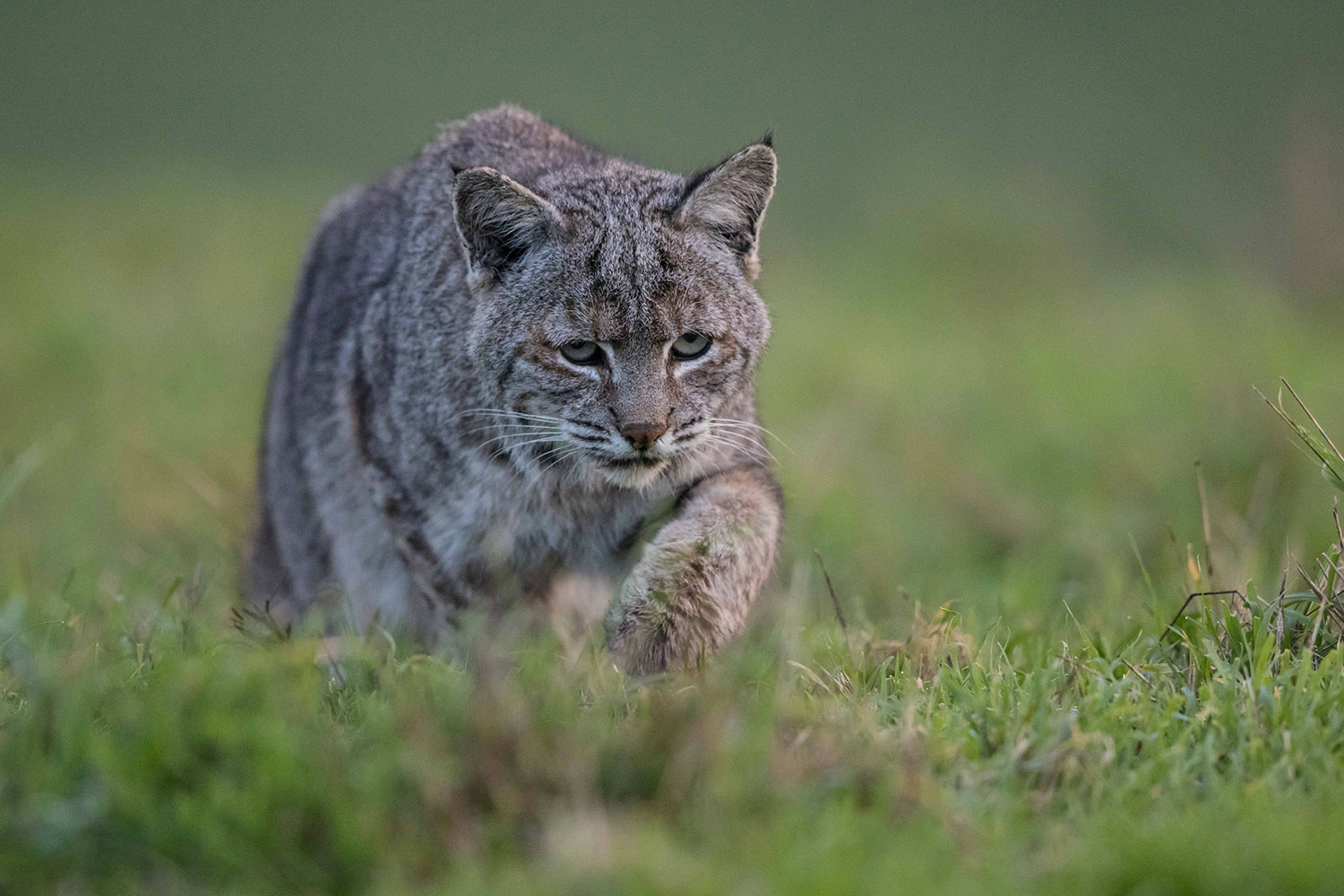
If wild animals have intrinsic value and are sentient beings who can suffer, this supplants a popular sentiment heard from sincere, liberal people with conservationist impulses. I always get a little uncomfortable when I hear a defense of wildlife or wilderness based on the anthropocentric notion of commonwealth (natural resources, land of many uses, good planets are hard to find, etc.) Wildlife belongs to everyone, you will hear, and if you over-hunt this area now, or clear cut it, or flood it with a boondoggle dam, we’ll all be denied beauty and recreation, and my grandchildren will inherit a less healthy, ecologically impoverished world. There are mindfulness and justification in that sentiment. However, it limits the sphere of concern, still, to people only, and does not oppose any kind of cruelty unless there is some consequence to people, some ricochet to be dodged. But wildlife belongs to itself and we should not arrange our ethics such that it admits of slaughtering innocent creatures so long as there’s plenty of them.
Wyoming Untrapped recently cosponsored a study which found that bobcats in Yellowstone are worth about 1,000 times more alive than dead. Such studies are quite useful in certain arenas and certainly there are many agencies and constituencies where such a finding will sway officials and policy, and this is good. Note this is a prudential argument, not a moral one. But hypothetically, what if the numbers had come out differently? The numbers might, in fact, come out differently for rhinos or pangolins or skunks, or Tule elk (as in Point Reyes National Seashore). Trophy hunters make similar claims in reverse for the net effects of their hunts (that the fees collected do more good than harm compared against the “taking” of the trophy animals), and the most common rebuttal is that they have the math backward. But once you accept a commercial set of terms, the chips will fall where they will.
Seemingly, things are improving, though not fast enough. I believe hunting and trapping will eventually go the way of slavery, segregation, corporal punishment, and frontier justice. I realize abhorrence of these is not quite universal, but as a society, we have sworn them off, and we presume private holdouts are a dying breed, if asymptotically. You can see parallels in the trends, with fewer defenders, fewer practitioners and mounting opposition in various public spheres. And as Steven Pinker points out in his book The Better Angels of Our Nature, there are tipping points — things can change quickly. It was not long ago when people in many cultures attended public executions, on a Saturday afternoon, as entertainment, jeering at the doomed on display.
Pinker:
“The way to explain the decline of violence is to identify the changes in our cultural and material milieu that have given our peaceable motives the upper hand.”
We are not genetically any different from our recent ancestors who were doing the jeering. Our grandparents and great-grandparents likely had beliefs and practices we find reprehensible, and an interesting question is, what are the things we do or tolerate now which will be similarly reviled by the generation about to be born. I hope there are many because it will mean progress.
Groups such as
Wyoming Untrapped, Project Coyote, the Center for Biological Diversity, embody “the changes in our cultural and material milieu that have given our peaceable motives the upper hand.” They are gathering momentum, exposing cruelty and injustice, amplifying and channeling growing public sentiment, and influencing policies and legislation. There is a new bill right now aiming to make animal cruelty a federal offense.
I encourage anyone motivated at all by the plight of wild animals who are hunted and trapped to do three things
- vote accordingly;
- reach out to support at least one group like those just mentioned;
- and don’t be afraid to let people know that you think it’s wrong and has to stop.
Ed Abbey:
“Sentiment without action is the ruin of the soul.”
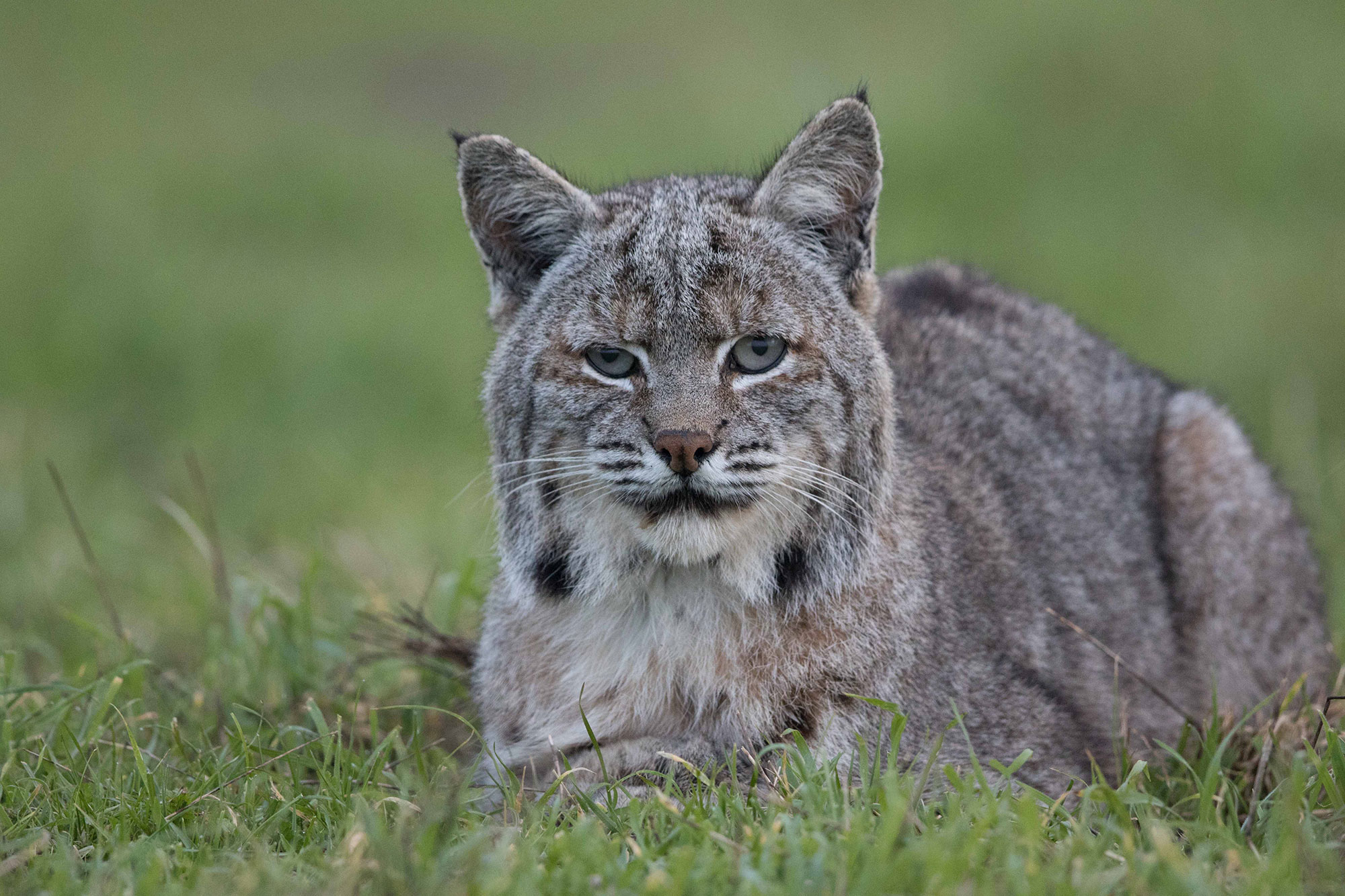
Personally, I’m allergic to confrontation, but the more I think about the immense suffering caused by hunting and trapping, the more I force myself to speak up.
“You have enemies? Good. That means you’ve stood up for something, sometime in your life.”
– Winston Churchill
Of course, if you are not motivated by this suffering, it’s unlikely an ethical argument is going to change that. Some people miss the good old days and would attend those public executions if only they were still on. Some are motivated only by self-interest and prudential arguments; some will simply obey the law; some are moved by fear of shame. The demographics of relevant attitudes, motivations, and practices are undoubtedly complex. And yet progress on the social scale seems inexorable.
Last Sunday as I was headed home after watching that bobcat, I saw another cat on the side of the road and stopped, got out slowly and quietly to peer over the raised shoulder and into the field where she (I think) was sitting still. I was fortunate to have two extraordinary sightings in one short afternoon. She saw me—they always do—and I was careful not to get too close. You never want to disturb a hunt or other essential activity (well, mostly, they hunt.) She wasn’t hunting though, but yawned, groomed, squinted, and stretched, much like my house cats do. (I’ve never heard a bobcat purr, but I read that they do.) This cat was free and relatively safe in a national park. Many more are in very different situations where they can be hunted or trapped without limit, where they are considered ‘furbearers,’ nuisance species, varmints. It’s not right, and it has to stop.



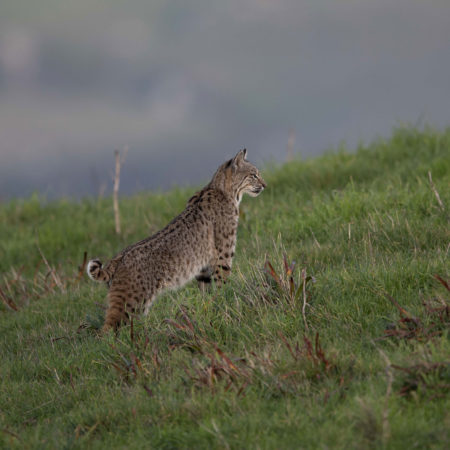
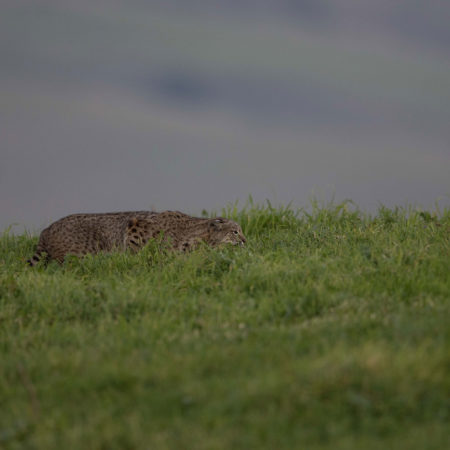
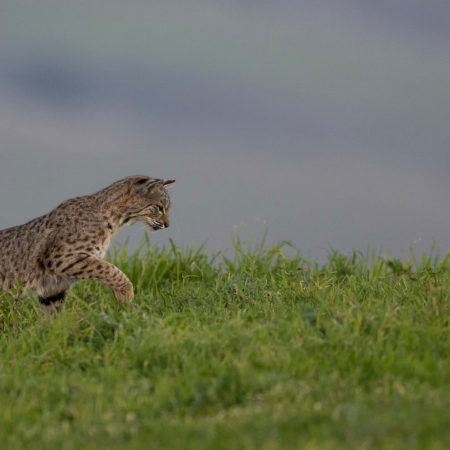
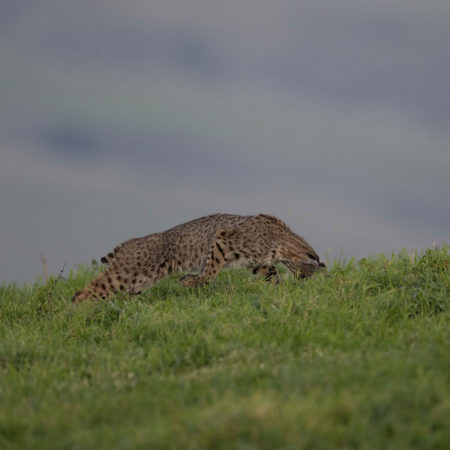
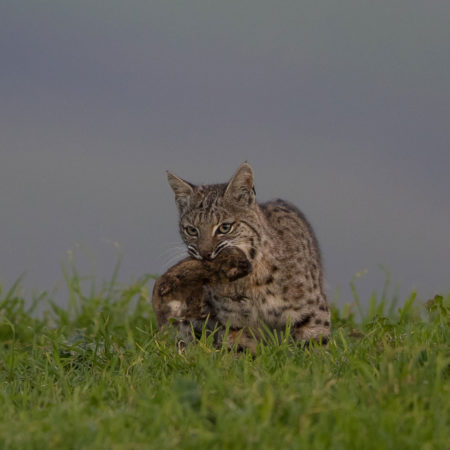
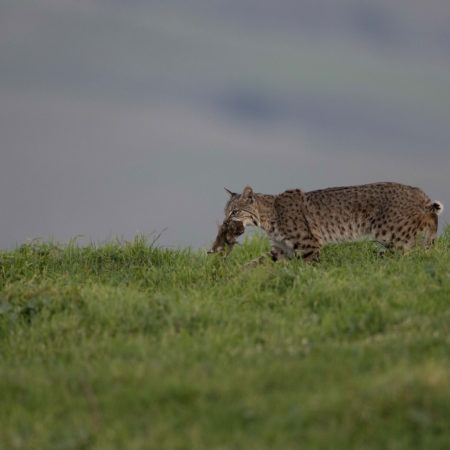
Scott Slocum
There’s a lot of thinking here that doesn’t happen in the minds of most hunters. For them, premise #2 is false, because they feel that their activity, their personal experience, and their food gathering through hunting is necessary for them, to satisfy their desires as creatures who have evolved to hunt. There’s no legal prohibition against them indulging their desires in these ways, because the laws haven’t changed that much since most men felt that way. And it could be argued that most men who take a position on the issue still feel that way.
Wyoming Untrapped
Well said, Scott. Thank you. We were just reading two new articles in one magazine: “The Predator Predicament: Finding a Balance With Prey – and With the Public.” And, “Assessing Ethics in Wildlife Management.” Some of us may never evolve from where we stand yesterday or today, but certainly, the trend is to re-examine how we co-exist with our remaining wild creatures. We hope we get it right.
Ken Bouley
Scott, thanks for the careful reading – really appreciated. Where you say hunters may feel that their activity is “necessary”…”to satisfy their desires…” – that’s not the normal meaning of “necessary” (because you want it) and that’s not the meaning I had in mind. If animals are worhty of moral consideration, then you can’t say since I want a certain personal experience, I can risk causing you suffering and take your life. The disparity of interests (hunters doing something they enjoy vs the right to continued existence free from agony) is stark, unignorable, and, in my opinion, ethically decisive.